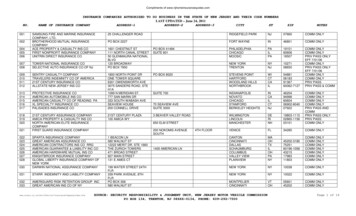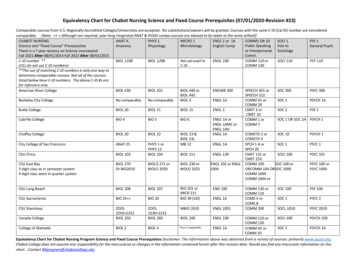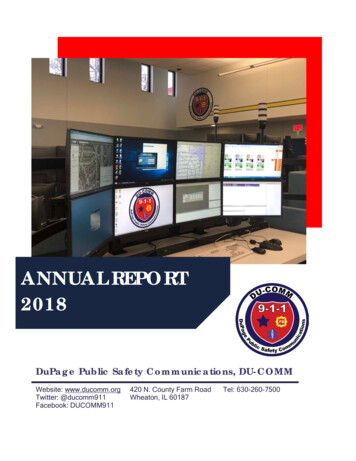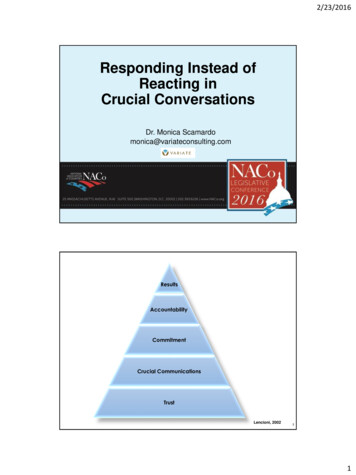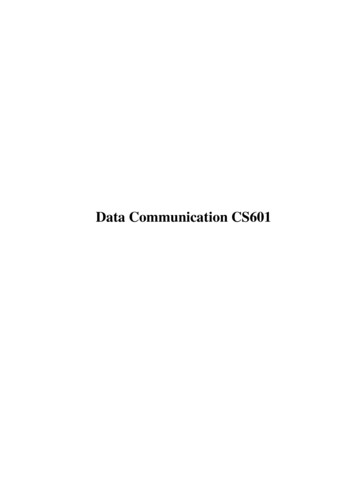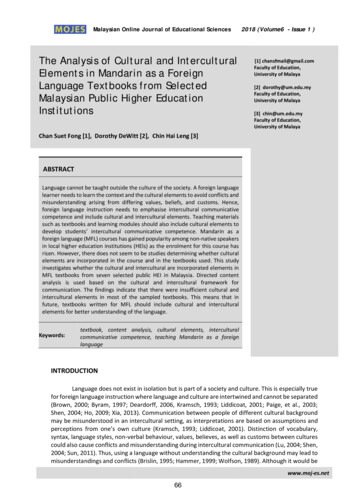![COMM 324 Intercultural Communication [online]](/img/24/20520.jpg)
Transcription
SAMPLE ONLYSUBJECT TO CHANGECOMM 324Intercultural CommunicationFall 2020 M/W 2-3:20pm [online]Instructor:Jillian Pierson, Ph.D.OfficeHours:Wed 10-12Thurs I encourage you to connect with me outside of our regularlyscheduled class meetings!These are my official Zoom “office hours” but if they aren’tconvenient for you, I’d be glad to meet you at other times.Check Blackboard for an office hours sign-up link, and emailme if you’d like to set up alternate times.I give you my cell phone number in case you want to send aquick text or would like to meet by phone. But for contentor assignment-related issues, email is the best way to connectwith me.Course GoalsThis class will introduce you to the field of intercultural communication, which draws from anarray of academic disciplines. The overall goal is to prepare you to be the best global citizen youcan be. Using readings, lectures, in-class exercises, discussions, film clips and your ownassignments, we will enhance our understanding of the myriad of ways that cultures differ;develop a meaningful vocabulary for discussing these differences; learn about processes thataffect intercultural interactions; investigate a variety of contexts in which interculturalcommunication takes place; and take an introductory look at the current strands of researchin the field.Learning ObjectivesSpecifically, by the end of the course students will be able to: Explain and apply terms used in intercultural communication scholarship Describe processes and contextual factors that affect intercultural communication Interpret real-world interactions through the framework of course concepts Recognize the different perspectives researchers bring to the study of intercultural communicationRequired TextsSamovar, L. A., Porter, R. E., McDaniel, E. R., & Roy, C. S. (2015). Interculturalcommunication: A reader (14th Ed.). Boston, MA: Cengage. [You must use the 14th edition.]Additional required readings are posted on Blackboard. Please check Blackboard frequently tofind links to readings and other information.Please note that even when class lectures and discussions do not cover material from the text,you will be required to read and thoroughly understand the readings for the exams andassignments.
SAMPLE ONLYSUBJECT TO CHANGETentative Course Schedule, Subject to Change:Most of the articles noted in the calendar are from the Samovar, Porter, McDaniel & Roy textbookwhich is an edited anthology. Readings not from the anthology are posted on Blackboard, as noted with“Bb.” The readings posted to Blackboard may be updated from the ones on this schedule.Topic1Aug 17Aug 192Aug 24Course welcome & introduction [assignments are due before class]A model of interculturalCulture descriptionMcDaniel, Samovar &communication interactionPorter 5-16ANDSaint-Jacques 16-26student info formKorzenny 42-46Approaches to the study ofBb: Martin & Nakayamaintercultural communicationchapterWorld viewBb: Ishi, Klopf & CookeJain 121-126; Begley 126132Dimensions of cultureYum 110-120Skow & Stephan 288-302Kim 405-417Cultural patternsAndersen; Ting-ToomeyBb: Robinson-----Labor Day, no class meeting----Bb: Triandis; McSweeney;Cultural patterns (cont)Research paradigmHofstedeTing-ToomeyIntercultural conflictIntergroup relationsRibeau, Baldwin & Hecht182-189Bb:MorberFrom cognition to interactionBb: Project ImplicitCultural identityExploration PaperChen 61-69Collier 53-60Pratt, Pratt, & Dixon 70-75Whiteness and privilegeBb: AAA Statement onRace; Crenshaw TED talkMartin 76-84ExamExamNonverbal communicationAndersen 229-242McDaniel 242-251Cultural identity and languageGay 302-319Ellis & Maoz 217-223Verbal aspects of intercultural commCargile 251-259Fong 209-216Language, meaning, and identityCultural transitionsKim 385-397Cultural change and developmentBb: CroucherAug 263Aug 31Sept 24Sept 7Sept 95Sept 14Sept 166Sept 21Sept 237Sept 288Sept 30Oct 5Oct 79Oct 12Oct 1410 Oct 19Oct 21Assignment DueRead after classDate2
SAMPLE ONLY11 Oct 26Oct 28SUBJECT TO CHANGECultural appropriationBb: Mannie; Cooper;D’AgostinoBb: tbd& other cultural dilemmas12 Nov 2Nov 4Culture project presentationsCulture project presentations13 Nov 9Culture and the workplaceNov 11Culture and medicineNov 20Final exam time set by universityFriday, 2 – 4 pmPresentation& responsesNishiyama 266-272;Hinner 273-288Rao 329-339Geist-Martin 320-329ExamCourse PoliciesRespectful conversation: We may touch on topics that some students feel sensitive about duringclass. If you find yourself having an emotional response, please reach out to me. Know that Iwant everyone to feel comfortable engaging in productive, open conversation, including at thetimes we don’t agree with one another. If I get something wrong, I’d like to hear from you in arespectful way; I have an open mind and like most people, I am still learning and evolving.I also hope you’ll be mindful that we all come to the classroom from a variety of backgroundsand life experiences. We can’t truly understand another person’s perspective, but we can listenwith acceptance and empathy.Attendance and Participation1. To get the most out of this class, you must show up for our meetings. While it is normal tomiss a few times during the course of a semester, you cannot “take” this class without attendingregularly.2. Some students may have to miss class because of a significant time difference, or illness, orfor other reasons. If you have to miss several classes, I would appreciate your letting me knowwhat is going on, so that I don’t worry about you.3. If you miss class, please view the Zoom recording and complete any alternative“participation” activity provided.Engagement and Note-takingThe best online class meetings will occur when everyone is focused and engaged. This can bechallenging in the Zoom environment, but I ask you to make a decision to be focused on ourclass during our meetings. I recommend you turn off your notifications and put aside your cellphone while we are together.3
SAMPLE ONLYSUBJECT TO CHANGEI also recommend that you take notes by hand. Most students work on laptops which means youhave a relatively small screen. Have a notebook and pen by your side so you can write noteswhile listening and participating during class. Current research shows that taking notes by handis more effective than typing them.CommunicationPlease be sure to read your USC emails and Blackboard announcements daily on weekdays.I reply to my emails within 24 hours (although on the weekends I may take longer). If you don’thear back from me promptly, feel free to send me a follow-up after a day has gone by.Timely submission of work: If your assignment is late, it will be marked down by one third of aletter grade for every day it is late. Also, please be aware that if you end up handing a paper inlate, it falls to the bottom of our stack of things to do and will most likely not be returned to youin a very timely manner.Sometimes a student has a true emergency. Please contact me as soon as possible if somethingprevents you from submitting your work on time.Accidentally uploading the wrong assignment or using a format not accepted by Blackboard isnot an excuse for a late submission.Back up your work: Computer failures are sadly not uncommon. Please cover yourself byregularly saving your work to cloud storage and to an external storage device.Electronic submission of assignmentsPlease upload your assignments to Blackboard only. If you have trouble with Blackboard, reachout to Blackboard support directly for help—service is available 24/7 at 213-740-5555.Blackboard submissions that have uploaded successfully automatically generate an email to thestudent who submitted them. If you don’t get the email, you haven’t submitted your assignment.If Blackboard has a problem, you may email your assignment as proof that you completed it bythe deadline. However, we can only grade in the Blackboard environment so you will still needto upload there as soon as the system is functioning.Zoom policiesIdeally, all students will attend class with their camera on, wearing classroom appropriateclothing. I of course understand and accept that sometimes it’s not possible to keep a camera ondue to bandwidth or other issues.Please keep your microphone off during class, except when you’re asked to unmute fordiscussion or questions.You are welcome to use virtual backgrounds but please select only classroom-appropriateimages.4
SAMPLE ONLYSUBJECT TO CHANGEZoom recordingsZoom recordings are for our internal class purposes only. Lecture content is consideredintellectual property, and the privacy of students is guaranteed by the Family Educational Rightsand Privacy Act (FERPA). It is your responsibility to keep our Zoom recordings private; youmay not save, distribute or share the recordings or transcripts with anyone.GradingI believe an “A” represents excellent, thoughtful, and enthusiastic work. A “B” represents reallygood work. A “C” merely meets all the requirements of the assignment. If you are disappointedby a grade, we would be happy to discuss our feedback with you and to help you improve for thenext assignment.The grading scale for this class will be that an A is equivalent to 94 or above; A- is 90-93; B is87-89; B is 84-86; B- is 80-83; C is 77-79; C is 74-76; C- is 70-73; D is 67-69; D is 64-66; Dis 60-63; and F is 59 and below.Grades will be calculated as follows:In-class & homeworkResearch paradigmPaperPresentationExam 1Exam 210%10%20%20%20%20%AssignmentsPlease read all instructions carefully and ask questions if you are unsure about the requirements.I’ve written out this detailed information to help you succeed on the assignments; look foradditional information and samples of most of these assignments on Blackboard.NB: The assignments you undertake should all be about cultures other than your own. You willhave many opportunities to share your own cultural background and experiences with us in classdiscussions. For your assignments, however, I want you to investigate new territory.In-class & homework (10%)Culture HomeworkWrite two or three paragraphs describing your own culture and what it means to you. (This is theone exception to the note above about not writing about your own culture!)Student Information FormPlease complete because I like to have the 4-1-1.Presentation DiscussionTowards the end of the semester, you will be asked to engage in discussion with your peers abouttheir presentations.5
SAMPLE ONLYSUBJECT TO CHANGEMiscellaneousThere will be other brief assignments that come up throughout the semester, either for in-classwork or homework. (When I ask for in-class participation assignments, I will work to create asuitable alternative for students who are unable to participate synchronously because of theirtime zone or other, select reasons.)Research Paradigm Assignment (10%)1. Find and read a recent research article in intercultural communication.2. Turn in the citation for the article along with the article’s published abstract.3. Based on the information presented in class and in the Martin and Nakayama chapter aboutresearch paradigms, write a brief paragraph or two explaining which perspective theauthor(s) took and what about their work made that perspective evident.Be sure to choose a research article in which the authors conducted some kind of study. Do notchoose a meta-analysis (a study of other studies), a book review, an essay, or an article that onlydiscusses theory.We will discuss in class how to look for articles in our USC Library system. Accepted sourcesinclude the International Journal of Intercultural Relations, Human Communication Research,and Journal of Intercultural Communication Research and others which are listed in theassignment on Blackboard.Cultural Exploration Paper (20%)This assignment combines a cultural exploration with knowledge gained from the textbook andyour own research. Each of these parts should enhance the other. The exploration should giveyou cultural knowledge that will help you understand the text and the text gives you a theoreticalperspective that will increase your understanding of what you see in your exploration.You will have two options for which type of exploration you would like to do:Option 1: Cultural InterviewInterview someone with very different cultural experiences than your own. After your interview,you will apply course concepts to what you’ve learned about their experiences. The finalproduct will be a 5-7 page application paper, citing relevant readings and an additional source tosupport your findings.Option 2: Cultural ExplorationConduct research on a specific aspect of intercultural communication you would like to learnmore about. You will write a 5-7 page paper applying course concepts to the phenomenonyou’ve chosen to study.Further details will be discussed in class and posted on Blackboard.6
SAMPLE ONLYSUBJECT TO CHANGECulture Project (20%)The culture project is an opportunity to research one aspect of the intercultural communicationfield that interests you and relate it to course concepts in a meaningful way. You will presentyour findings in a brief, informative oral presentation of about 5-7 minutes, accompanied withslides. Your topic should be something very specific, new to you for this course, and subject tomy approval.Some of these presentations may be pre-recorded and shared using VoiceThread (or similar).More details will be forthcoming.Exams (40%)The exams assess if you have learned the material covered in the readings, lectures, and classdiscussions. They will require you to apply what you have learned and demonstrate your abilityto analyze intercultural situations. Prepare for a series of rigorous multiple choice questions onthe exams. If you know yourself to be someone who finds these kinds of tests particularlychallenging, check my posts on Blackboard and seek help early in the semester.Please note that you are responsible for both the material presented in the readings and in class.The two do not always overlap.The final will not be “cumulative” in that you will not have to go back to the earlier chapters andstudy them in depth. However, your knowledge will build, and the questions on the second exammay reflect that knowledge base.Joint Educational Project (JEP) optionIn lieu of preparing a culture project presentation, you may apply to volunteer with JEP in one oftheir community-based organizations such as Central American Resource Center (CARECEN) orAsian Americans Advancing Justice (AAAJ). If you participate, you will be overseen by andprovide reports of your activities to JEP staff. At the end of the semester your grade (for this20% portion of the class) will be given to me by JEP in consultation with the serviceorganization where you volunteered. Volunteer opportunities this semester will likely be heldonline. You will also give a brief, informal presentation to our class about your experience.JEP has a limited number of spaces available—perhaps more limited than usual during thepandemic—and the application deadline is very early in the semester. Please contact themdirectly if you’re interested. /Campus ResourcesPlease take advantage of some of the resources your tuition supports. Early in the semester,visit The Writing Center for one-on-one assistance or small-group workshops. (Emailwriting@usc.edu or call 213-740-3691). If you have difficulty with tests, reach out to theCenter for Academic Support (call 213-740-0776 or email them at study@usc.edu).7
SAMPLE ONLYSUBJECT TO CHANGELooking AheadEvery semester one of the great benefits of teaching this class is that I get to learn from thewealth of experiences and backgrounds students bring to the course. I’ll be your guide throughthe materials, but you will make many contributions. I look forward to your participation and tolearning more together about culture and communication.Statement on Academic Conduct and Support SystemsAcademic Integrity Policy:The School of Communication maintains a commitment to the highest standards of ethical conduct and academicexcellence. Any student found responsible for plagiarism, fabrication, cheating on examinations, or purchasingpapers or other assignments will be reported to the Office of Student Judicial Affairs and Community Standardsand may be dismissed from the School of Communication. There are no exceptions to the school’s policy.Academic Conduct:Plagiarism – presenting someone else’s ideas as your own, either verbatim or recast in your own words – is aserious academic offense with serious consequences. Please familiarize yourself with the discussion of plagiarismin SCampus in Part B, Section 11, “Behavior Violating University Standards” policy.usc.edu/scampus‐part‐b. Otherforms of academic dishonesty are equally unacceptable. See additional information in SCampus and universitypolicies on scientific misconduct, policy.usc.edu/scientific‐misconduct.In addition, it is assumed that the work you submit for this course is work you have produced entirely by yourself,and has not been previously produced by you for submission in another course, without approval of theinstructor.Emergency Preparedness/Course Continuity in a CrisisIn case of a declared emergency if travel to campus is not feasible, USC executive leadership will announce anelectronic way for instructors to teach students in their residence halls or homes using a combination ofBlackboard, teleconferencing, and other technologies. See the university’s site on Campus Safety and EmergencyPreparedness.Support Systems:Counseling and Mental Health ‐ (213) 740‐9355 – 24/7 on callstudenthealth.usc.edu/counselingFree and confidential mental health treatment for students, including short‐term psychotherapy, group counseling,stress fitness workshops, and crisis intervention.National Suicide Prevention Lifeline ‐ 1 (800) 273‐8255 – 24/7 on callsuicidepreventionlifeline.orgFree and confidential emotional support to people in suicidal crisis or emotional distress 24 hours a day, 7 days aweek.Relationship and Sexual Violence Prevention Services (RSVP) ‐ (213) 740‐9355(WELL), press “0” after hours – 24/7on call studenthealth.usc.edu/sexual‐assaultFree and confidential therapy services, workshops, and training for situations related to gender‐based harm.Office of Equity and Diversity (OED) ‐ (213) 740‐5086 Title IX – (213) 821‐8298equity.usc.edu, titleix.usc.eduInformation about how to get help or help someone affected by harassment or discrimination, rights of protectedclasses, reporting options, and additional resources for students, faculty, staff, visitors, and applicants.8
SAMPLE ONLYSUBJECT TO CHANGEReporting Incidents of Bias or Harassment ‐ (213) 740‐5086 or (213) 821‐8298usc‐advocate.symplicity.com/care reportAvenue to report incidents of bias, hate crimes, and microaggressions to the Office of Equity and Diversity Title IXfor appropriate investigation, supportive measures, and response.The Office of Disability Services and Programs ‐ (213) 740‐0776dsp.usc.eduSupport and accommodations for students with disabilities. Services include assistance in providingreaders/notetakers/interpreters, special accommodations for test taking needs, assistance with architecturalbarriers, assistive technology, and support for individual needs.USC Campus Support and Intervention ‐ (213) 821‐4710campussupport.usc.eduAssists students and families in resolving complex personal, financial, and academic issues adversely affecting theirsuccess as a student.Diversity at USC ‐ (213) 740‐2101diversity.usc.eduInformation on events, programs and training, the Provost’s Diversity and Inclusion Council, Diversity Liaisons foreach academic school, chronology, participation, and various resources for students.USC Emergency ‐ UPC: (213) 740‐4321, HSC: (323) 442‐1000 – 24/7 on calldps.usc.edu, emergency.usc.eduEmergency assistance and avenue to report a crime. Latest updates regarding safety, including ways in whichinstruction will be continued if an officially declared emergency makes travel to campus infeasible.USC Department of Public Safety ‐ UPC: (213) 740‐6000, HSC: (323) 442‐120 – 24/7 on calldps.usc.eduNon‐emergency assistance or information.Annenberg Student Success esources/additional‐funding‐resourcesThe Annenberg Student Success Fund is a donor‐funded financial aid account available to USC Annenbergundergraduate and graduate students for non‐tuition expenses related to extra‐ and co‐curricular programs andopportunities.9
Intercultural communication: A reader (14th Ed.). Boston, MA: Cengage. [You must use the 14th edition.] Additional required readings are posted on Blackboard. Please check Blackboard fr

